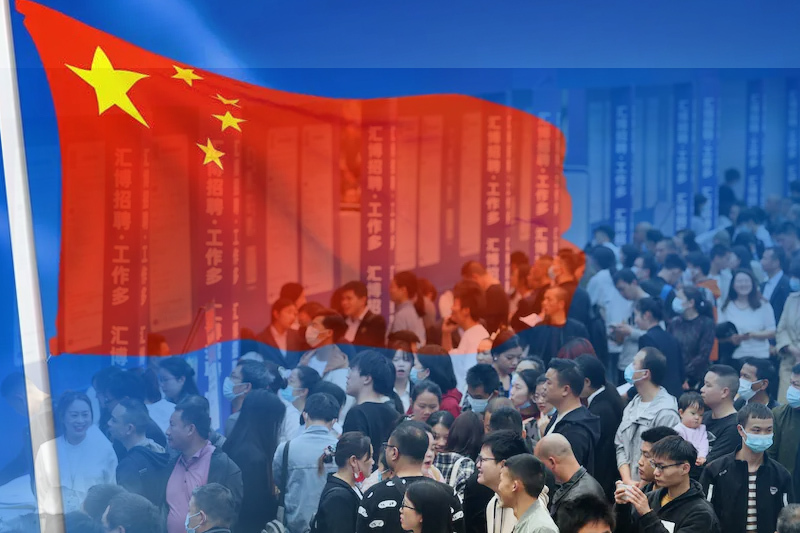
china’s youth unemployment rate rose to 20.4% report
In April, urban employment among Chinese citizens aged 16 to 24 reached a record high of 20.4%, according to official data.
This is nearly four times the country’s overall unemployment rate, even though millions more college students are anticipated to graduate this year.
Yao Lu, a sociology professor at Columbia University in New York, declared that “this college bubble is finally bursting.” There is an imbalance between the supply and demand of highly skilled workers as a result of the expansion of higher education in the late 1990s. The economy is still behind.
Another problem that Chinese youth and policymakers must address is the scourge of underemployment.
In a paper Lu co-authored with Xiaogang Li, a professor at Xi’an Jiaotong University, the professors estimated that in addition to the rising youth unemployment rate, at least another quarter of college graduates in China are underemployed.
To avoid unemployment, more college graduates are taking jobs that are below their qualifications and training, according to Lu. When people settle for low-skilled or low-paying jobs, or occasionally part-time work because they can’t find full-time jobs that match their skills, underemployment results.
The non-college educated used to hold the majority of these jobs, according to Lu.
In other societies, the detrimental effects of graduating during a challenging economic period have been well documented. According to Stanford University research, college grads who begin their working careers during an economic downturn or recession will make less money for at least 10 to 15 years than those who graduate during prosperous times.
lingering discontentment?
When people settle for low-skilled or low-paying jobs, or occasional part-time work, because they can’t find full-time jobs that match their skills, underemployment results.
Keep Reading
The non-college educated used to hold the majority of these jobs, according to Lu.
In other societies, the detrimental effects of graduating during a challenging economic period have been well documented. According to Stanford University research, college grads who begin their working careers during an economic downturn or recession will make less money for at least 10 to 15 years than those who graduate during prosperous times.
lingering discontentment?
Six million of the 96 million 16 to 24-year-olds in China’s urban labor force are currently unemployed, according to data from the country’s Bureau of Statistics. From According to statistics from the International Labour Organisation, while China is not the only society in the world with double-digit youth unemployment, few other societies are aware of the scope of China’s issue.
The central government of China is well aware of this issue.
China’s State Council unveiled a 15-point plan in April with the goal of better matching young job seekers with available positions. In addition, a promise to temporarily increase hiring at state-owned businesses and support for the entrepreneurial aspirations of recent college graduates and migrant workers are included.
structural inconsistency
“The labor market and higher education institutions are frequently at odds in many societies, including China. They don’t always converse with one another, Lu said. Universities have a general understanding of the state of the labor market and the skills employers seek, but this understanding is frequently dated and may occasionally be distorted.
Additionally, there is a disconnect between the evolving expectations of younger, more educated generations and an economy that is not progressing at the same rate.
According to Jean Yeung, a professor of sociology at the National University of Singapore, “These young people are not willing to go back to factory jobs anymore because of the rapid increase in education, both for men and women.”
According to China’s Ministry of Human Resources and Social Security, the nation’s manufacturing jobs could go unfilled by nearly 30 million by 2025, despite rising youth unemployment rates. According to the ministry, that amounts to almost half of all jobs in the industry.
However, Yeung continued, “The goal was for China’s economy to shift from a labor-intensive industry to one that was more technologically advanced and had a strong knowledge-based service sector.
However, Qazi claims that in China’s state-run economy, this transition appears to be half-hearted.
According to economists, support for the private sector is essential for a thriving services-based economy. However, the issue is that small and medium-sized businesses cannot access credit.
“Until that happens, you’re not going to have services in the private sector being able to absorb these young graduates who want to work in the new industries, the industries of the future, and then be able to have that massive economic transition,” Qazi said. “Everything is connected,”
Cyclical problems
The “zero Covid” policy adopted by China during the pandemic resulted in factory closures and a two-month lockdown in Shanghai, the country’s financial hub, last year as the rest of the economy came to a grinding halt.
According to Goldman Sachs, the slowdown in the services sector at the beginning of the year, before China reopened, may have contributed to the high youth unemployment rate that is currently present.
However, according to analysts from a U.S. investment bank, the summer months of July and August will likely see a peak in China’s youth unemployment rate due to the influx of recent college graduates.
The young, a demographic that typically accounts for almost 20% of consumption in China, would regain their purchasing power if they were allowed to find employment, according to Goldman Sachs economists.
However, the jobs might be different from what they want or are trained for.
I find it ironic that the majority of college graduates today find it difficult to find high-skill jobs despite having a degree, said Lu. But because everyone else is getting it, it’s also becoming unnecessary.









